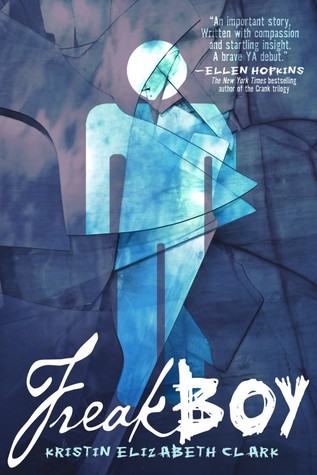Clark, K. E. (2013). Freakboy. New York, NY: Farrar, Straus and Giroux.
Summary: Brendan Chase might appear to have the perfect life to some. He is on the wrestling team and has a beautiful girlfriend. But Brendan has a secret. Sometimes he doesn't feel like society asks him to feel. In verse, along with two other narrators, Brendan shares his secret and Kristin Elizabeth Clark explores the topic of gender fluidity.
Review: Clark's Freakboy is a powerful read. This book is so necessary in school libraries for all students. Due to some of the sex scenes, I would assign this as 8th grade and up. But many sections of the book could be excerpted for a younger audience. Because Clark writes in verse, this novel moves quickly and the words are razor sharp.
Diversity: Clark explores gender fluidity--when a person doesn't feel like his/her assigned gender. There are few books written about this topic and also it is a diversity that is predominantly unseen by others. This voice is missing in YA literature. Brendan's (and Vanessa's) questioning of themselves normalizes this thought process for others and Angel's strong, decisive character gives us a role model. Gender fluidity is a topic that often doesn't come up when students discuss diversity in middle school. It's a story that is rarely mainstreamed or presented. Clark's novel can be that ally for young people and my hope that it's just the beginning of many other stories about questioning gender and sexuality to fill library shelves so that those who feel this way are not alone. This is a book that needs to be book-talked to students and with the cover faced out in libraries. It needs to be shown off and heard about so it doesn't go unnoticed. As teacher librarians, it's great to have the newest Rick Riordan, but it's books like these that need to be brought to the attention of students.
Diversity: Clark explores gender fluidity--when a person doesn't feel like his/her assigned gender. There are few books written about this topic and also it is a diversity that is predominantly unseen by others. This voice is missing in YA literature. Brendan's (and Vanessa's) questioning of themselves normalizes this thought process for others and Angel's strong, decisive character gives us a role model. Gender fluidity is a topic that often doesn't come up when students discuss diversity in middle school. It's a story that is rarely mainstreamed or presented. Clark's novel can be that ally for young people and my hope that it's just the beginning of many other stories about questioning gender and sexuality to fill library shelves so that those who feel this way are not alone. This is a book that needs to be book-talked to students and with the cover faced out in libraries. It needs to be shown off and heard about so it doesn't go unnoticed. As teacher librarians, it's great to have the newest Rick Riordan, but it's books like these that need to be brought to the attention of students.
Suggestions for Teachers: Use this as a core text in an ELA classroom or excerpt it for younger audiences. Teach it as poetry and examine interior monologue, sensory description and diction. This is also a book to plug for independent reading or lit circles.
Reading Level:
- Quantitative: Lexile 800L, ATOS Book Level 5.8, Flesh-Kincaid 4.5. Readability Grade Level 6.0, RMM
- Qualitative: This text is moderately complex. There are three narrators and they are telling their side of the story. Each narrator tells his/her story chronologically, but there is no order or pattern and each narrator's story occurs unpredictably. Language is largely contemporary and explicit. Because the text is written in verse, there are more figurative language uses. Students who have some knowledge of gender fluidity will more easily comprehend the text.
Content Areas: English, Contemporary Issues
Common Core State Standards:
CCSS.ELA-LITERACY.RL.9-10.2
Determine a theme or central idea of a text and analyze in detail its development over the course of the text, including how it emerges and is shaped and refined by specific details; provide an objective summary of the text.
Determine a theme or central idea of a text and analyze in detail its development over the course of the text, including how it emerges and is shaped and refined by specific details; provide an objective summary of the text.
CCSS.ELA-LITERACY.RL.9-10.3
Analyze how complex characters (e.g., those with multiple or conflicting motivations) develop over the course of a text, interact with other characters, and advance the plot or develop the theme.
Analyze how complex characters (e.g., those with multiple or conflicting motivations) develop over the course of a text, interact with other characters, and advance the plot or develop the theme.
CCSS.ELA-LITERACY.RL.9-10.4
Determine the meaning of words and phrases as they are used in the text, including figurative and connotative meanings; analyze the cumulative impact of specific word choices on meaning and tone (e.g., how the language evokes a sense of time and place; how it sets a formal or informal tone).
Determine the meaning of words and phrases as they are used in the text, including figurative and connotative meanings; analyze the cumulative impact of specific word choices on meaning and tone (e.g., how the language evokes a sense of time and place; how it sets a formal or informal tone).
CCSS.ELA-LITERACY.RL.9-10.5
Analyze how an author's choices concerning how to structure a text, order events within it (e.g., parallel plots), and manipulate time (e.g., pacing, flashbacks) create such effects as mystery, tension, or surprise.
Analyze how an author's choices concerning how to structure a text, order events within it (e.g., parallel plots), and manipulate time (e.g., pacing, flashbacks) create such effects as mystery, tension, or surprise.
Relevant links: Teaching Books, Author's Website, LGBTQQ resources, Conversation between Ellen Hopkins and Clark, Interview with Author
Subjects/Themes: LGBTQQ, gender fluidity, transgender, coming of age, identity
Awards: N/A
Awards: N/A
Series Information: N/A

No comments:
Post a Comment